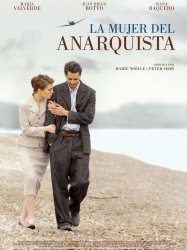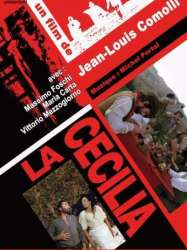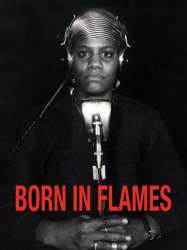Films with theme "Films about anarchism", sorted by revenue

Slacker (1991)
, 1h40Directed by Richard Linklater
Origin USA
Genres Drama, Comedy, Comedy-drama
Themes Films about anarchism, Politique, Political films
Actors Richard Linklater, Abra Moore, Athiná-Rachél Tsangári, Lee Daniel, Robert Jacks, Tommy Pallotta
Slacker is a uniquely structured and seemingly plotless film, following a single day in the life of an ensemble of mostly under-40 bohemians and misfits in Austin, Texas. The film follows various characters and scenes, never staying with one character or conversation for more than a few minutes before picking up someone else in the scene and following them. The characters include Linklater as a talkative taxi passenger, a UFO buff who insists the U.S. has been on the moon since the 1950s, a JFK conspiracy theorist, an elderly anarchist who befriends a man trying to rob his house, a serial television set collector, and a hipster woman trying to sell a Madonna pap smear. The woman selling the pap smear appears on the film poster, and was played by Butthole Surfers drummer Teresa Taylor. Most of the characters grapple with feelings of social exclusion or political marginalization, which are recurring themes in their conversations. They discuss social class, terrorism, joblessness, and government control of the media.

Eight Miles High (2007)
, 1h54Directed by Achim Bornhak
Origin German
Genres Drama, Biography, Comedy, Comedy-drama, Musical
Themes Feminist films, Films about anarchism, Films about music and musicians, Naturisme, Politique, Transport films, Le thème des vacances, Films about automobiles, Musical films, Political films, Road movies
Actors Natalia Avelon, Matthias Schweighöfer, David Scheller, Georg Friedrich, Urs Rechn, Inga Busch
Obermaier enjoyed sexual freedom at the legendary Kommune 1 in Berlin after being with the krautrock band, Amon Düül. In the Kommune, she becomes friendly with Rainer Langhans. The young woman from Munich gains employment as a model, and becomes a sex symbol and youth icon. Now a cover girl in Playboy magazine, she meets rock stars such as Mick Jagger and Keith Richards, while Italian film producer, Carlo Ponti, offers her a ten-year contract, but she declines: her freedom is more important than a contract.

The Anarchist's Wife (2008)
Directed by Marie-Noëlle Sehr
Genres Drama, Historical, Romance
Themes Films about anarchism, Political films
Actors Nina Hoss, Laura Morante, María Valverde, Ivana Baquero, Jean-Marc Barr, Irene Montalà
L'histoire de Manuela, une femme dont l'époux, Justo, se bat pour ses idéaux durant la guerre civile espagnole. Justo est alors déporté dans un camp de concentration mais poursuit sa lutte pour ses idéaux. Durant des années Manuela n'a aucune nouvelle de son mari, mais celle-ci ne perd pas espoir.

The Anarchist's Wife (2008)
, 1h52Directed by Marie-Noëlle Sehr
Genres Drama, Historical, Romance
Themes Films about anarchism, Politique, Political films
Actors María Valverde, Ivana Baquero, Nina Hoss, Laura Morante, Jean-Marc Barr, Irene Montalà
Justo est un républicain anarchiste espagnol marié à Manuela. À cause de l'avancée des franquistes sur Madrid, il est contraint de partir vers Barcelone. Il fait ensuite partie des 400 000 républicains qui se réfugient en France. Manuela est restée à Madrid et ignore ce qu'est devenu son mari Justo. Celui-ci est déporté en Allemagne dans les camps nazis. Manuela fait des recherches pour savoir ce qu'il est devenu. Ce n'est que lorsque la frontière franco-espagnole est rouverte, bien après la fin de la 2e guerre mondiale qu'elle le retrouve en France.

Land and Freedom (1995)
, 1h49Directed by Ken Loach
Origin United-kingdom
Genres Drama, War, Historical, Romance
Themes Films about anarchism, Politique, Political films
Actors Ian Hart, Rosana Pastor, Frédéric Pierrot, Icíar Bollaín, Tom Gilroy, Pascal Demolon
The film's narrative unfolds in a long flashback. David Carr has died at an old age and his granddaughter discovers old letters, newspapers and other documents in his room: what we see in the film is what he had lived.

The Anarchist Cookbook (2002)
, 1h42Origin USA
Genres Drama, Thriller, Comedy, Comedy-drama, Romantic comedy
Themes Films about anarchism, Medical-themed films, Films about drugs, Political films
Actors Devon Gummersall, Dylan Bruno, Gina Philips, Johnny Whitworth, Katharine Towne, John Savage
The story is narrated by the protagonist, Puck, who opens with a monologue describing the basic reasoning underlying his philosophy, as well as the film's general interpretation of Anarchism, as he walks through the commune he lives in, while events of his daily life are presented.

Zero for Conduct (1933)
, 41minutesDirected by Jean Vigo
Origin France
Genres Drama, Comedy, Comedy-drama
Themes L'adolescence, Films about education, Films about children, Films about anarchism, Politique, Political films, L'enseignement secondaire en France
Actors Jean Dasté, Pierre Blanchar, Léon Larive, Louis Lefebvre, Henri Storck
Four rebellious young boys at a repressive French boarding school plot and execute a revolt against their teachers and take over the school.

The Eagle with Two Heads (1948)
, 1h37Directed by Jean Cocteau
Origin France
Genres Drama, Historical, Romance
Themes Films about anarchism, Politique, Théâtre, Political films, Films based on plays, Films about royalty
Actors Edwige Feuillère, Jean Marais, Jean Debucourt, Silvia Monfort, Jacques Varennes, Yvonne de Bray
On the 10th anniversary of the assassination of the king, his reclusive widow, the Queen, arrives to spend the night at the castle of Krantz. Stanislas, a young anarchist poet who seeks to assassinate her, enters her room, wounded; he looks exactly like the dead king, and the Queen shelters him instead of handing him over to the police. She sees him as the welcome embodiment of her own death, calling him Azrael (the angel of death). An ambiguous love develops between them, uniting them in a bid to outwit the machinations of the court politicians, represented by the Comte de Foëhn, the chief of police, and Édith de Berg, the Queen's companion. In order to remain true to their ideals and to each other, the Queen and Stanislas have to play their parts in a bizarre private tragedy, which the world will never understand.

To Die in Madrid (1963)
, 1h25Origin France
Genres Documentary
Themes Films about anarchism, Politique, Documentary films about war, Documentary films about historical events, Documentary films about politics, Documentary films about anarchism, Political films
Actors John Gielgud, Irene Worth, Suzanne Flon, Germaine Montero, Pierre Vaneck, Jean Vilar
1936. Une guerre civile éclate en Espagne. Durant quatre années, Républicains et Nationalistes s'affrontent jusqu'à la dictature franquiste.

Eros + Massacre (1969)
, 3h22Directed by Yoshishige Yoshida
Origin Japon
Genres Drama, Biography, Documentary
Themes Films about anarchism, Seafaring films, Politique, Films about sexuality, Transport films, Erotic films, Political films
Actors Mariko Okada, Toshiyuki Hosokawa, Yūko Kusunoki, Yoshisada Sakaguchi
The film is a biography of anarchist Sakae Ōsugi, who was assassinated by the Japanese military in 1923. The story tells of his relationship with three women: Hori Yasuko, his wife; Noe Itō, his third lover, who was to die with him; and his jealous, second lover, Masaoka Itsuko, a militant feminist who attempts to kill him in a tea house in 1916. Parallel to the telling of Ōsugi’s life, two students (Eiko and Wada) do research on the political theories and ideas of free love that he upheld. Some of the characters from the past and from the present meet and engage the themes of the movie.

La Cecilia (1976)
, 1h53Directed by Jean-Louis Comolli
Origin France
Genres Drama
Themes Films about anarchism, Politique, Political films
Actors Vittorio Mezzogiorno, Maria Carta, Biagio Pelligra
À la fin du XIX siècle, des anarchistes italiens, dix hommes, une femme, libertaires, collectivistes, émigrent au Brésil pour y fonder une communauté sans chef, sans hiérarchie, sans patron, sans police, mais pas sans conflit, ni passion.

Salvador (2006)
, 2h18Directed by Manuel Huerga
Origin United-kingdom
Genres Drama, Biography, Historical
Themes Films about anarchism, Politique, Political films, Films about capital punishment
Actors Daniel Brühl, Leonardo Sbaraglia, Leonor Watling, Ingrid Rubio, Mercedes Sampietro, Carlota Olcina
Le 2 mars 1974, sous le régime de Franco, Salvador Puig i Antich, militant espagnol anarchiste, a été le dernier exécuté par « garrot vil ». Le film retrace la vie de Salvador depuis son engagement politique au sein du MIL jusqu'à son exécution.

Born in Flames (1983)
, 1h20Directed by Lizzie Borden
Origin USA
Genres Drama, Science fiction, Comedy-drama, Politic
Themes Feminist films, Films about anarchism, Politique, Films about sexuality, LGBT-related films, Political films, Dystopian films, LGBT-related films, LGBT-related film, Lesbian-related films
Actors Kathryn Bigelow, Pat Murphy, Mark Boone Junior, Ron Vawter, Eric Bogosian, Hal Miller
The plot concerns two feminist groups in New York City, each voicing their concerns to the public by pirate radio. One group, led by an outspoken white lesbian, Isabel (Adele Bertei), operates "Radio Ragazza". The other group, led by a soft-spoken African-American, Honey (Honey), operates "Phoenix Radio". The local community is stimulated into action after a world-traveling political activist, Adelaide Norris (Jean Satterfield), is arrested upon arriving at a New York City airport, and suspiciously dies while in police custody. Also, there is a Women's Army led by Hilary Hurst (Hilary Hurst) and advised by Zella (Flo Kennedy) that initially both Honey and Isabel refuse to join. This group, along with Norris and the radio stations, are under investigation by a callous FBI agent (Ron Vawter). Their progress is tracked by three editors(Becky Johnston, Pat Murphy, Kathryn Bigelow) for a socialist newspaper run by screenwriter Ed Bowes, who go so far they get fired.

Sweet Bunch (1983)
, 2h31Origin Grece
Genres Drama, Thriller, Crime
Themes Films about films, Films about anarchism, Politique, Films about sexuality, Films about television, Films about terrorism, Films about pornography, Political films
Actors Haris Romas
A group of four misfits, Argyris, Andreas, Marina, and Sofia, live together in a house. Argyris just got out of jail. All four have become disillusioned with life and have lost any reason to live or die. They try all criminal experiences with each member of the group choosing a different activity to experiment in: frequenting expansive restaurants and leaving without paying, shoplifting, starring in pornographic films, and creating an anti-state organization. The authorities put them under surveillance, waiting for the slightest false step from any of them before acting violently. The first such misstep occurs when Sofia kills the police chief who monitors their home.

The Strategy of the Snail (1993)
, 1h47Directed by Sergio Cabrera
Origin Colombie
Genres Drama, Comedy, Comedy-drama
Themes Films about anarchism, Political films
Actors Frank Ramírez
The film starts with news reporter Jose Antonio Pupo (played by Carlos Vives) interviewing a man after the movie events had taken place. This gentleman who is also a tenant reveals to the journalist how the material house where the tenants lived for so many years was taken to a different place by rudimentary but ingenious means.The man's story entangles with the depiction of the events.
 Connection
Connection